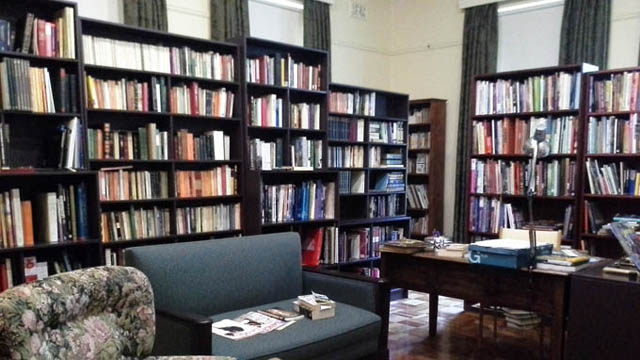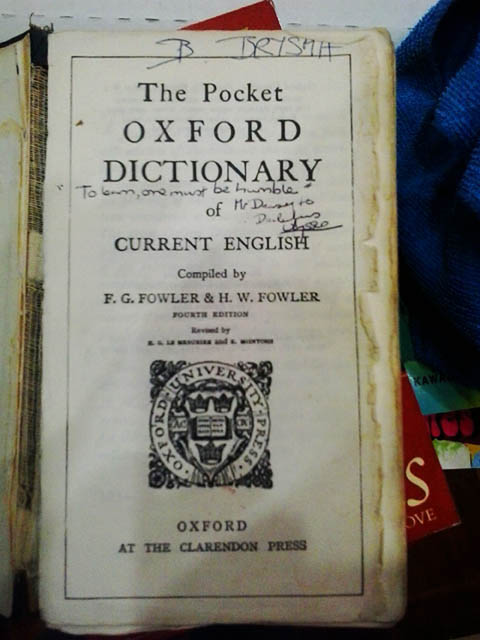In Praise of Private Libraries

Since when has having a personal library been deemed “book hoarding”? The damning pejorative “hoarding” is one of the more recent catch cries of the same consumer culture that has given us enough disposable income to spend on all the goods it produces.
To make way for more stuff, you have to get rid of the stuff you already got. We care not for the what and why of anything. Money rules and constant acquisition of new stuff is king. Some people are very worried about all the stuff we are dumping in landfill and even about the concepts of fast foods and fast fashion. No worries, there’s someone out there to sell you slow food and all that goes into producing it, from carefully provenanced ingredients to fancy slow cooking appliances, that’s if you don’t go out and consume it a price from someone with something to sell. So you buy experiences like frequent travel, especially by air. There you go, in your sustainable organic cotton clothes ethically produced by a middle class person just up the street in your expensive neighbourhood, to enjoy some foreign sight and carefully curated tourist experience. The real cost of that trip to the environment is a taboo subject. Also, it’s a good idea to see the world before all you can see everywhere you go is the rubbish we have discarded, which is stubbornly refusing to perish despite its obsolescence having been carefully planned. Thank goodness, there’s land being cleared all around the world, which may hold a bit more rubbish yet, like the countless new books being churned out for which we need to make space in our homes.
In this culture the idea of keeping anything for any length of time is held as suspect, so much so that the more neutral connotations of hoarding, like to store up or amass, are completely overshadowed by notions of mental illness and entrapment under a mountain of stuff made rubbish by its vast quantity and inaccessibility. That’s terrible. Get rid of it fast. Errr, what about that other mountain of rubbish we are building from our discarded stuff?
Some of us are becoming quite careful in what stuff we acquire and what happens to it when we no longer need/want it. I have always been very careful about acquiring books because I never bought a book that I suspected I would not want to keep or that I could not pass on to a good home. Although in the past school text books could be sold secondhand, I kept my French language books as reference, which proved handy for university French 1. I kept those books, too and they have proved most useful. Then I kept my daughter’s Oxford Hatchette French dictionary. Coulda got big bucks for that baby at the school secondhand book sale. You want one? Get it here secondhand from Betterworld Books. Yes, like all those I’ve slagged off above, I’ve got stuff to sell you: books, as a matter of fact, principally eBooks with no need of ink and paper and no shelf space issues. But I’m not after your money; I want you to read the books because they’re wonderful. In a way, this is what most publishers are trying to do. These days the industry is a juggernaut and some are doing very nicely, thank you, but many are just getting by, doing what they believe in and what they love. Thank goodness, no-one is yet questioning the value of reading although we are living in an age when a comprehensive or discursive piece of journalism of more than say 1000 words is apologetically referred to as “longform” and that is a worry.
Meanwhile, back to “book hoarding” lest you think the lady doth protest too much. Ironically, although enamoured of eBook technology, I keep a personal library of more than 5,000 hard print books. This statistic is based on a rough count I did a dozen years ago when trying to explain to a real estate agent why a big open plan house he was showing me did not have enough wall space to take my book cases. Naturally, I’ve acquired a few more since. I know every book in my possession and where it belongs on my shelves. I also know why I have it even though I have far from read each one cover to cover. Until some 30 years ago, I only owned less than 100 books. Until then I bought with extreme caution, believing that public and institutional libraries were a reliable long-term repository for meeting my needs. Not true. St Kilda Library got rid of Anton Dolin’s Ballet Go Round when I wasn’t looking. A big scholarly book on Japanese gardens that I had actually considered keeping and paying the library for having “lost” it, also one day vanished from the catalogue! Then there are the few books I didn’t buy and regretted ever since, like the paperback about conversations with Elvis beyond the grave. It was in a display outside a tobacconist’s shop in Acland St. I picked it up and could not stop laughing. As one who wishes to die laughing, I don’t know what stopped me from buying it. However, I do remember what stopped me buying a stunning coffee table book entitled James Joyce’s Odyssey: A Guide to the Dublin of Ulysses in the mid-80s—the price. It brimmed with beautiful photographs of settings and locations as featured in Ulysses; after some years of regret I tried to find it again. Works by Joyce—from which I exempt his carry on fucking letters to Nora with their celebrations of excessively frilly drawers and bestial rumpy-pumpy—I have collected, mostly in secondhand paperback, since my disenchantment with the reliabilities of libraries not my own. The first Joyce I read was Portrait of an Artist as a Young Man being myself then the appropriate age. One of the books I have longest owned, my school days Oxford Pocket Dictionary bears the inscription: ‘“To learn one must be humble” Mr Deasy to Dedalus’. Paradoxically, I wasn’t humble enough to admit that mid-adolescence couldn’t chart the deep waters of Joyce’s prose or grasp the first thing about dreary ancient Leopold Bloom. My Pocket Oxford is going in the coffin with me.
So I keep a few books. And I read voraciously, maniacally. I have a hierarchy of which books are read at what time of day. Travel books about foreign lands are read after 11 pm, when I’m too tired to concentrate on more complex books. Recently I read a submitted MS without interruption by other books. The storyline about Australian suburban life circa 1960 had me gripped. The narrative’s fluidly shifting perspectives had me in thrall. Then there are books you want to read slowly over a long time, like Ulysses or Kerouac’s Desolation Angels, my current affair.
The written word has enriched my entire existence. And what is a book but a natty container for the written word. If you have a book around you, you can enter levels of existence otherwise unimaginable. And now we have eBooks which enable us to read a book on our phones, so almost wherever you are, whatever you are doing, you can also read, which is ideal for relieving the tedium of waiting in queues or for anything else, for being unavoidably stuck in any situation demanding your physical presence but not compellingly engaging your mind, like staff meetings, lectures and longwinded phone calls on speakerphone. Looking surreptitiously at your phone is universally accepted but ‘having your nose stuck in a book,’ remains frowned upon by the world at large. Luckily, in your own home you may even keep a library with multiple dictionaries and books about all things that take your fancy and bring you joy. Don’t let anyone tell you otherwise.



